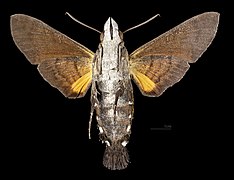Macroglossum sitiene
| Crisp-banded hummingbird hawkmoth | |
|---|---|

| |
| Scientific classification | |
| Domain: | Eukaryota |
| Kingdom: | Animalia |
| Phylum: | Arthropoda |
| Class: | Insecta |
| Order: | Lepidoptera |
| Family: | Sphingidae |
| Genus: | Macroglossum |
| Species: | M. sitiene
|
| Binomial name | |
| Macroglossum sitiene | |
| Synonyms | |
| |
Macroglossum sitiene, the crisp-banded hummingbird hawkmoth, is a moth of the family Sphingidae described by Francis Walker in 1856.
Distribution
It is known from Sri Lanka, eastern India, Bangladesh, Myanmar, Thailand, southern China, Taiwan, southern Japan (the Ryukyu Archipelago), Vietnam, Peninsular Malaysia and Sumatra, Indonesia.
Description
The wingspan is 46–56 mm. The thorax is olive green. Forewings are without reddish tinge and the antemedial band is filled in black and recurved along the inner margin. The first two postmedial lines rather more angled below the costa. There is a black subapical streak and spot on the terminal segment of the abdomen strongly developed. A yellow band can be seen on the hindwings. Ventral side consist with three transverse lines on hindwing.[2] Larva is polymorphic, with both green and brown forms. Horn is long and slightly up-curved. Head and thorax of pupa is dull greenish grey, and the rest of the body is brownish grey.[3]
-
Male dorsal
-
Male ventral
Ecology
Adults are attracted to Duranta erecta and Lantana camara blossoms. They prefer flowers low down on bushes, and fly very close to the ground when approaching.
Larvae have been recorded feeding on Paederia scandens in Hong Kong, Morinda umbellata and Paederia tomentosa farther north in China and mainly Morinda citridora in Thailand.
References
- ^ "CATE Creating a Taxonomic eScience - Sphingidae". Cate-sphingidae.org. Archived from the original on 2012-10-08. Retrieved 2011-10-25.
- ^ Hampson, G. F. (1892). The Fauna of British India, Including Ceylon and Burma: Moths Volume I. Taylor and Francis – via Biodiversity Heritage Library.
- ^ Pittaway, A. R.; Kitching, I. J. (2018). "Macroglossum sitiene Walker, 1856 -- Crisp-banded hummingbird hawkmoth". Sphingidae of the Eastern Palaearctic. Retrieved 16 December 2018.


